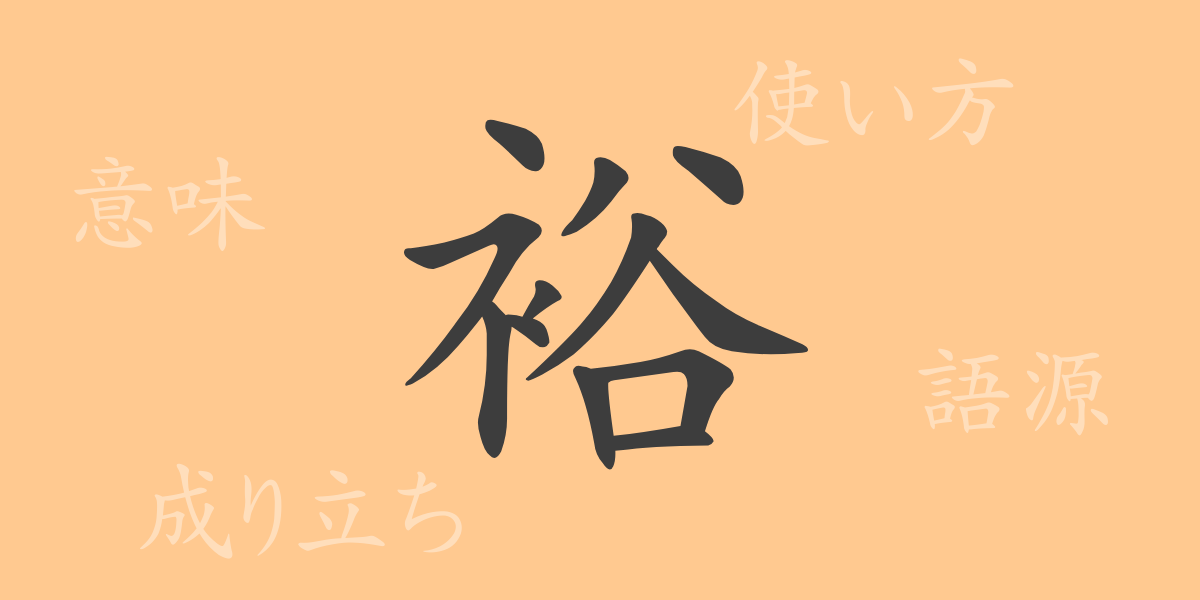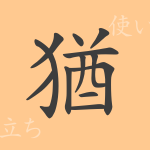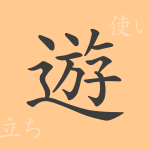Japanese words are renowned for their subtlety and profound meanings. The 常用漢字 (じょうようかんじ, Jōyō Kanji) character 「裕」 (ゆう, Yū) is no exception. In this article, we will delve into the origin, meaning, usage, and cultural significance of the kanji 「裕」 (ゆう, Yū). We hope that our readers will be able to use 「裕」 (ゆう, Yū) more richly in their daily lives.
Origin of 裕 (ゆう, Yū)
The kanji 「裕」 (ゆう, Yū) is a character that was transmitted from ancient China. Its form is composed of the radical for clothing, 「衣」 (ころも, Koromo), and the radical for abundance or surplus, 「谷」 (たに, Tani). This combination signifies clothing made abundantly and generously, which is also the etymology of the word 「裕福」 (ゆうふく, Yūfuku), meaning “wealthy.”
Meaning and Usage of 裕 (ゆう, Yū)
The basic meaning of 「裕」 (ゆう, Yū) is “leeway” or “abundance.” In Japanese, it is used in words like 「裕福」 (ゆうふく, Yūfuku) and 「余裕」 (よゆう, Yoyū) to express material and mental abundance or surplus. When used to describe a person, it can also indicate that the person has generosity or magnanimity.
Reading, Stroke Count, and Radical of 裕 (ゆう, Yū)
To fully understand the kanji 「裕」 (ゆう, Yū), it is important to know its readings and structure.
- Reading: The On’yomi (音読み, Chinese reading) is 「ユウ」 (ゆう, Yū), and there is no specific Kun’yomi (訓読み, Japanese reading).
- Stroke Count: It has a total of 12 strokes.
- Radical: The radical is 「衣」 (ころも, Koromo).
Idioms, Expressions, and Proverbs Using 裕 (ゆう, Yū) and Their Meanings
There are many idioms and expressions in Japanese that include 「裕」 (ゆう, Yū). Here are some examples along with their meanings:
- 裕福 (ゆうふく, Yūfuku): A state of being materially wealthy and having a comfortable life.
- 余裕 (よゆう, Yoyū): Having mental leeway, or having surplus time or financial resources.
- 裕容 (ゆうよう, Yūyō): A relaxed and composed demeanor.
Summary of 裕 (ゆう, Yū)
The kanji 「裕」 (ゆう, Yū) symbolizes abundance and leeway, adding deep meaning to our language. Through this article, we hope that our readers can understand the rich expressive power of 「裕」 (ゆう, Yū) and apply it in daily communication. Words are one of the elements that shape culture, and each kanji, like 「裕」 (ゆう, Yū), supports the beauty of the Japanese language.

























